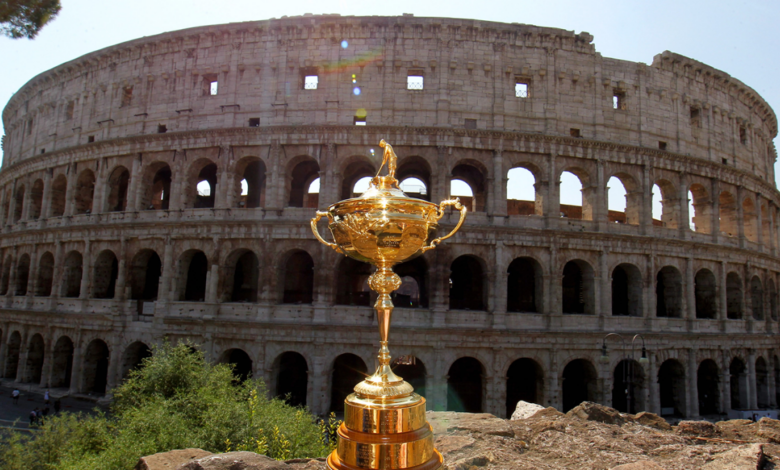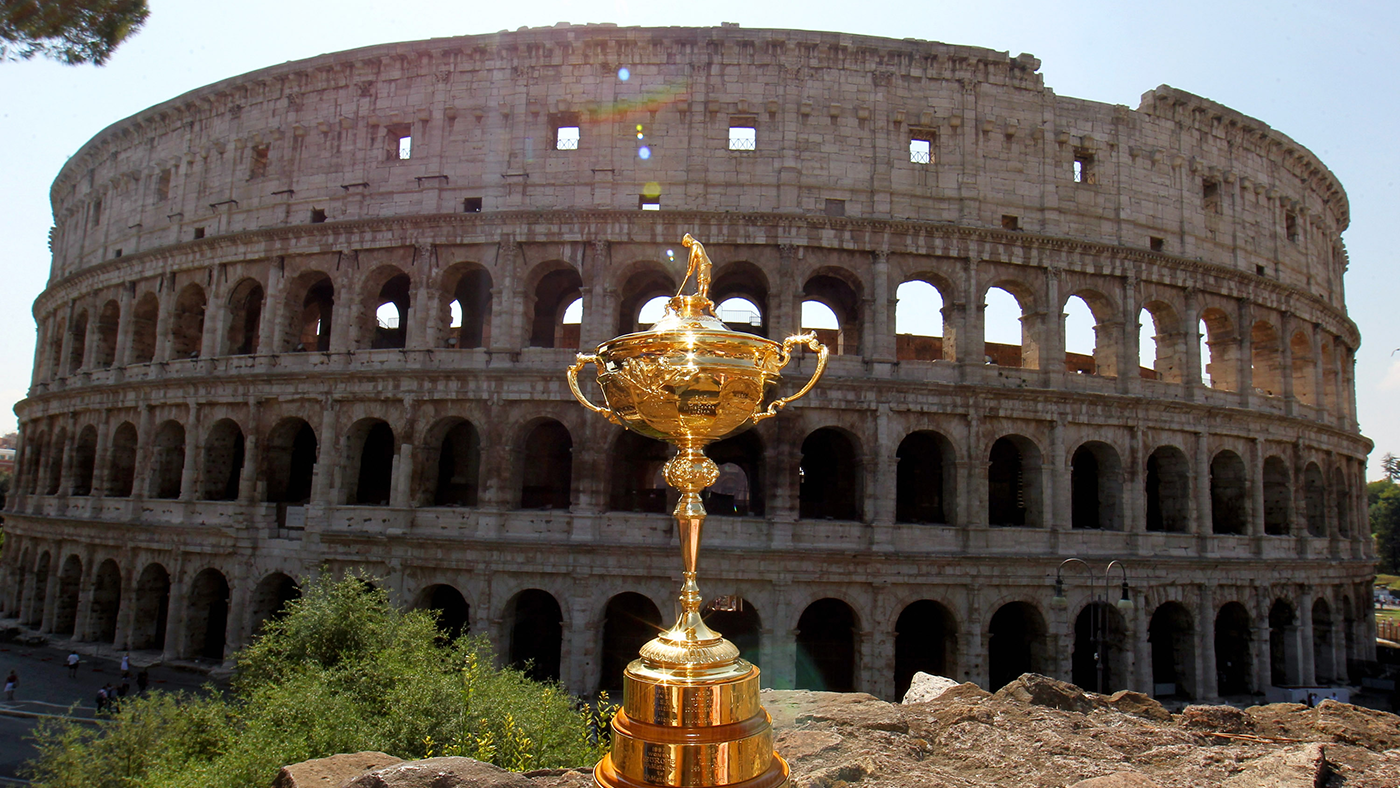Why the Ryder Cup stands as an enduring monument of unity amid an intrinsically egocentric sport


ROME — It’s been 15 years since I visited Rome. In 2008, subsequent to a study abroad stint in London, two friends and I backpacked our way around Europe as cheaply as we could. We slept at hostels in places like Madrid, Paris and Berlin. We visited Spanish beaches and Italian countrysides. It was, as far as trips go, impossible to match because you’re never as innocent as you are when you’re 22 years old and seeing the world for the first time.
I remember visiting the Colosseum. It was one of a long list of boxes we wanted to check. We talked about it all trip. It was going to be one of the highlights of the fortnight. Strangely, though, as I walked into this iconic venue that holds so much world history and symbolism, all I remember thinking is, “Man, it’s smaller than I thought.”
This is how 22-year-olds think, though. When you’re that age and you have the entire world in front of you, you don’t realize just how small and insignificant you actually are. This is normal, of course, something we all go through and eventually come out of through years of maturity and the accumulation of self-awareness.
When I visited the Colosseum again Monday after the 44th Ryder Cup — as a 38-year-old dad with four kids (unwilling to fight!) — all I could think about was its grandeur and the absurdity of such a structure being constructed 1,943 years ago (!) taking less than 10 years to build. I am grateful that, as I get older, the world continues to become larger and my appreciation of it continues to grow.
I am hopeful that this is always my experience.
As Rory McIlroy walked off the 18th green at Marco Simone Golf and Country Club on Sunday evening — following the best performance of his indelible Ryder Cup career — he was stopped by an interviewer from the BBC with a camera shoved into his face.
“It’s the best tournament in golf,” he said, parroting his own line from Whistling Straits in 2021. “There’s no other place that we play that can replicate half of what that is. There’s no other tournament in the world where [caddie] Harry [Diamond] tries to get me to eat on the course and I’m like, ‘No I can’t,’ because I’m too nervous.
“Nowhere else does that happen.”
There are perhaps better ways to sum up the Ryder Cup experience, but there cannot be many.
Nowhere else do seemingly rational adults awaken at 4 a.m. to engage in a foot race toward an Erector Set-like structure of metal just to see eight golf swings over the next six hours. That is sociopathic behavior, and people pay to engage in it.
Nowhere else is the 13th shot of the event — Viktor Hovland’s chip in on Friday morning — referenced as a turning point for the week.
Nowhere else is there such a rollercoaster of emotion from the opening tee shot.
Nowhere else does the best craftsman in the world break down in the middle of a workday, hiding fresh tears in his mighty hands.
Nowhere else are men with Roman emperor-like wealth reduced to puddles over videos of encouragement from the people that they love.
Nowhere else does a grown man get in an expletive-laced screaming match in the parking lot of a sporting event about where another grown man stood on a small plot of grass relative to a 4-inch hole cut somewhere in the ground.
Nowhere else do journalists lean over, as one did on the final hole of the Matt Fitzpatrick-Max Homa match and ask, “Should my heart be racing like this?”
Nowhere else does a tweet about a hat change the entire tenor of a $100 million festival.
Nowhere else do thousands of people serenade one another (and a host of sportsmen they’ll likely never know personally) with songs they’re making up on the fly and chants that give you chills.
Nowhere else do your legs shake with such a heavy fear.
Nowhere else do they roll 20 deep for 400 consecutive yards as a human wave crashes up and down the fairway before a shot is hit.
Nowhere else do you tell everyone you were joking with your teammates about not wanting the tournament to come down to your match … even though you know that everyone else knows it was not a joke at all.
Nowhere else do men with mortgages and wives and kids and flights they need to catch sing and dance like the jubilant children, the ones they once were who dreamed of attending this event.
Nowhere else.
On Sunday evening, I asked Rory why, as he gets older, these Ryder Cups tend to get more meaningful and emotional. His answer rocked.
“As time goes by [you say to yourself], ‘This is my seventh Ryder Cup; am I going to play in another seven?’ I don’t know. I’m probably on the back nine of my Ryder Cup career, and every one that I get to play in from now on is very, very meaningful.”
As your window get smaller, the world gets bigger. You begin to realize just how fortunate you are for what you have been afforded the opportunity to do.
This is hardly a line Rory had been fed.
We had a long conversation a few months ago. At one point, he looked up at me with a what seemed like a half grin on his face and said while gesturing to the invisible golf world, “You know, all of this is just really ridiculous, right?” The insinuation was that his gratitude for the life he’s been able to live — even after all these years and all those Ryder Cups — remains at an all-time high.
There are now multiple reports from around the United States team that two of its stars, Xander Schauffele and Patrick Cantlay — or at least the people around those stars — are frustrated because they believe players be paid for their services at this event. It would appear that a tweet ostensibly about a hat was not about a hat at all. It was actually about what some people seem to care about the most.
Europe captain Luke Donald was asked whether he believes Ryder Cup players should be paid. He responded emphatically that he absolutely does not.
“It represents true sport,” he said. “You saw it with some of the passion at the end there. It’s a passionate event. It’s about pride. It’s about representing your country. It’s about coming together as a team. It’s the purest form of competition we have, and I think because of that, the fans love it. There’s no extrinsic motivation involved. It’s purely, purely sport.
“That’s what makes it so special.”
Nowhere else.
Getty Images
There’s a legitimate conversation to be had about the way nine figures worth of revenue from the Ryder Cup gets distributed. I’m not unwilling to have that conversation. I’m just not sure the months and weeks leading into the event is the time to have it.
As Jamie Weir reported over the weekend, this has been a behind-the-scenes talking point for Patrick Cantlay. As No Laying Up reported on Monday, it has been an in-front-of-the-scene talking point for Schauffele’s father, Stefan. “Imagine if the winners got $2 million and the losers get nothing,” Stefan told NLU. “How good of a competition would we have now? I think it could be made so much better because of that. I don’t see a negative there.”
It’s such a reflection of a capitalism-at-all-costs mindset to believe that being paid for an experience you can’t find anywhere else is the one thing this week lacks. A master class in completely missing the point. If they think all of this is about that, then the U.S. side is not making the cultural progress it claims when it comes to this event.
All of this reeks not of selfishness (again, there is a conversation to be had about getting paid) but of self-importance, a terrible temptation for everyone in life. When you don’t know any better, though, then you don’t truly understand how massive the Ryder Cup is and how little it needs you. How many times this week did you think about Sergio Garcia? And how many times did he think about the Ryder Cup?
Nowhere else.
The ability to forget one’s self is where joy is truly found.
This is what the Euros have figured out. This is why they own the event, why they have won eight of the last 11 and why, even when they lose on the road like they have the last two times in the U.S., they’re so much easier to cheer.
“It’s the ability to walk through those doors and forget about who you are outside of this week,” said Rahm on Sunday in a moment of tremendous clarity and poignancy. “What you have done or what you may do afterwards really, truly doesn’t matter.”
There are a hundred proverbs over a thousand years that would affirm that self-forgetfulness, indeed, is the path to deep delight.
Forgetfulness of self means not being so concerned about the money, sure, but it’s also the willingness to look foolish in front of millions of people because what you care about most is that your team knows you care. The Europeans, affectionately, parade around like fools — screaming and yelling and dancing — throughout the week at Ryder Cups. It is a trait that is both endearing and instructive.
They are amused by all of this. As one person close to the European team told me early in the week, the Ryder Cup gala on Wednesday was special because it was at the Spanish Steps (the Spanish Steps!), but it also gave their side an on-course advantage because it irritated at least some of the Americans that they had to go.
It’s these Americans, a few of them, anyway, who believe that being paid for these three days would be additive. What they do not calculate is that everything would also become more transactional. They, as one commenter posited to me, know the cost of everything and the value of nothing.
The Colosseum, it seems, is still small to them.
Getty Images
When I got on the plane a week ago to cover my first Ryder Cup in Europe, I felt strangely emotional. These weeks are markers in time, and they are so special. Every one of them is a treasure that cannot be bought or sold. To not recognize this — to not embrace it! — is the height of hubris. These weeks are a celebration of the game at its highest level but also of the terrific little commune of folks who follow and truly love this preposterous sport. They are meant to be enjoyed and coveted, not leveraged against the world.
All of these reports happened on the heels of Keegan Bradley saying he would pay $10 million to play in the event. That’s how much the experience means. You get the feeling that every European feels the same. Trying to imagine one of them voicing concerns about the finances of the European Tour compared to their own is like trying to imagine the U.S. winning a foursomes session.
When you’re a certain age or have a certain outlook on life, the world seems small and you seem far more important than you actually are. So you disregard experiences because it’s difficult to appreciate them when you think they’ll never end. You assume that you can control them, that the world revolves around you.
As you get older and realize that you are not that important at all, you try to hold on desperately to whatever experiences you have before they start to slip away. You begin to have an inkling not only that the world does not revolve around you, but that it never did.
Rory, who was once that age and once disregarded these experiences, spoke Sunday evening about the passage of time. This hit me pretty hard.
“Just spending time with these guys is becoming more meaningful because I know I don’t have that many [Ryder Cups] left,” he said. “To see guys like Ludvig [Aberg] come in here and be an absolute stud and take everything in stride, I wish I was in his position again, looking forward to playing in 15 or 20 Ryder Cups or whatever it is he’s going to play in.”
I wish I was in his position again.
Nowhere else.
As we walked away from the Colosseum on Monday evening, I was reminded that. the older I get, the tighter I cling to these Ryder Cup weeks and what a good thing this is. I don’t want to feel like I have the world in the palm of my hand. I don’t want to think that the Colosseum is small. No, I want to feel like the Colosseum is big because feeling personally small in light of that gives me the freedom necessary to live for something far beyond than myself.
As I headed back into the Eternal City, I thought about this Ryder Cup and all the Schauffele-Cantlay nonsense that has started leaking out. I also thought about my 22-year-old self and all the statues and columns and carvings both that version of me and this one walked past. And as we passed monument after monument of some of the most powerful humans in the history of the world, I thought about how difficult it must be for important people to forget about themselves.
And yet, what was true of them is also true of us. Life is not about how much we can take but how much we give away. The European players understand this, pulling in their rookies and dancing with their fans. They forget themselves and remember everyone else. The Americans — at least some of them — seem to be intent on the opposite: remembering only self and forgetting everyone else.
Asked about his parents, who have passed away, and what it would have meant for them to see him win a Ryder Cup as the captain of the European team, Donald provided an incredible response. After a brief moment of reflection, his answer gave me chills.
“Some of the things that we talked as a group was it’s really, really important to not just play for each other but play for those that mean the most to you,” he said. “That’s super powerful. I gave the guys some videos on Monday, just some people that mean a lot to them, 2-minute videos, really giving them encouragement.
“That’s why we always play this game. It’s not just for ourselves. That’s what makes the Ryder Cup so special is we play it for the people that mean so much to us.”
Only here.
Nowhere else.




